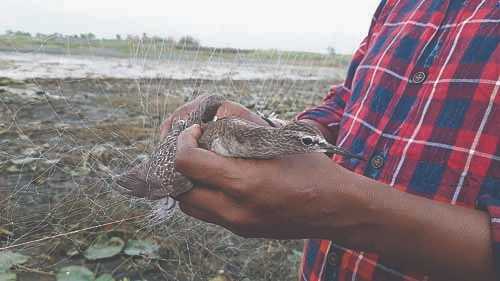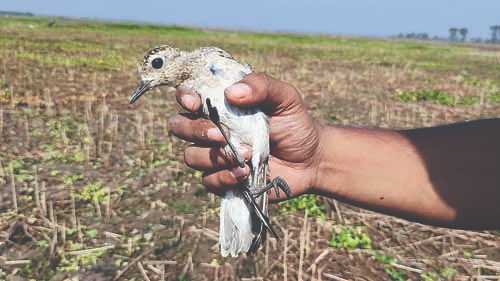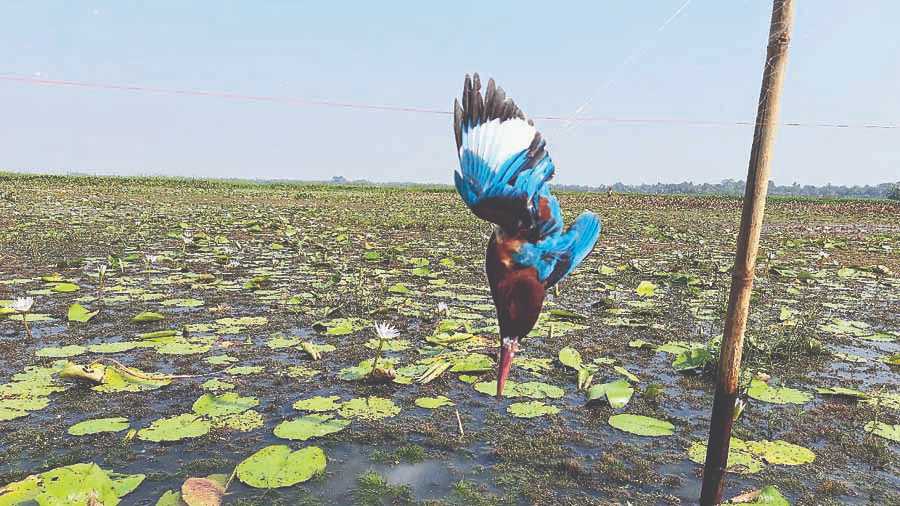A vast wetland near Calcutta has emerged as a popular drive destination over the past few months. The wetland is also a killing field for hundreds of birds every day, many of whom fly in from thousands of kilometres away, said birders and conservationists.
A man was arrested from Bortir Bill in Nilgunj, North 24-Parganas, around 35km from the heart of Calcutta, on Sunday evening with a net and dead birds. The arrest has blown the lid off an alleged mass killing of birds at the wetland by a section of residents of the area, wildlife activists said.
Over the past three days, scores of nylon nets — some of them 100-metres long — have been removed from the wetland. The nets, white and almost transparent, are as good as invisible. The only giveaway are the bamboo poles on which the nets are erected.

A Wood Sandpiper, a migratory bird from Siberia Pictures courtesy: HEAL
The birds fly into the net and get trapped. They are allegedly sold at local markets the next day.
The wetland, which spans over 60sq km, is home to a thriving population of local birds, including a variety of herons and snipes.
During winter, when the water recedes, the wetland is the destination of many migratory birds, mainly from central Asia and Trans-Siberian region. Some of them are Glossy Ibis, Eurasian Coot, Pacific Golden Plover and Wood Sandpiper, said birdwatchers.
The place has been known to birders for some time. It emerged as a popular destination for nature lovers during the lockdown, generating significant online traction and attracting flocks of photographers, amateur and professional. But the alleged killings did not come to the fore until recently.
“The nets were set up after sundown and removed before sunset. We had received information from some residents about the killings,” said Sumanta Pramanick, a volunteer with Human and Environment Alliance League (HEAL), the NGO that has visited the place several times over the past week, filming the nets, visiting local markets posing as possible customers of birds and talking to residents on the alleged killings.
“Not all trapped birds are eaten. But they are also trapped in the nets and are injured. They are left to die,” said Pramanick.
“This (the killings) have been going on for many years now. But the scale has gone up in the past five-six years. The local markets see hundreds of birds, dead and injured, every day. The birds sell for anywhere between Rs 150 and 400 apiece,” said a resident who requested anonymity for fear of reprisal, since a part of the local population is said to be involved in the alleged killings.
The NGO, HEAL, collaborated with the state forest department in conducting raids at some of the local markets. Films shot by HEAL members and shared with this newspaper showed several birds trapped in the nets.
Birdwatcher and conservationist Sujan Chatterjee identified some of the trapped birds as the Pacific Golden Plover and Wood Sandpiper. The former comes from the Pacific coasts off Russia and China, while the latter comes from Siberia, he said.
V.K. Yadav, the chief wildlife warden of Bengal, said the forest department had received complaints about migratory birds being killed at Bortir Bill. “Egrets (local birds) were found on the man who was arrested on Sunday. We have got some reports, on the basis of which we are conducting raids at nearby markets,” said Yadav.

Pacific Golden Plover, another migratory bird from Pacific coasts off Russia and China, trapped in nets. Pictures courtesy: HEAL
“There is nothing that suggests that the birds are being hunted for commercial use. Some people might hunt birds for personal consumption. We are looking into the issue and will do all that is needed,” he said.
But conservationists said the recovery of so many nets from the area suggested otherwise. “People don’t spend so much for a personal meal. The scale of investment points to large-scale commercial incentives. I cannot recall a previous instance of such large-scale killing of migratory birds in the recent past,” said Chatterjee.
The raids and the arrest are expected to act as a deterrent for people engaged in hunting the birds, said members of the NGO. “Awareness programmes explaining the ecological importance of the birds would not yield immediate results,” said Meghna Banerjee, a founder member of HEAL.
“We are collating a comprehensive report to be submitted to the forest department. At least a few hundred birds were being killed every day,” she added.










